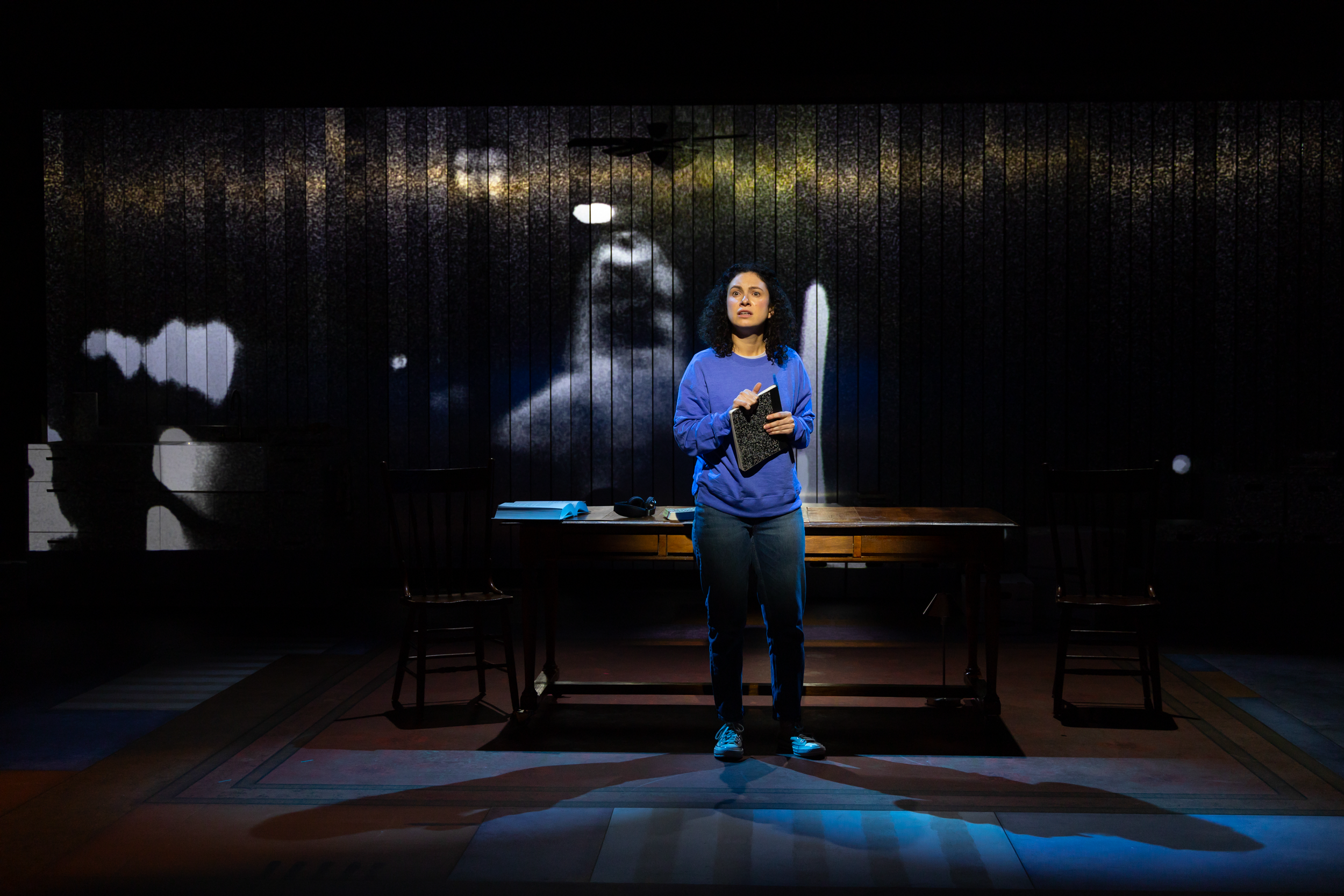Review of Simona’s Search, Hartford Stage
There’s a Biblical saying (from Deuteronomy) about the sins or iniquities of the fathers being visited upon the sons unto the third or fourth generation. In Simona’s Search, a world premiere play at Hartford Stage directed by Melia Bensussen, playwright Martin Zimmerman considers the possibility of a genetic link whereby the trauma of the parent is visited upon (or inherited by) a subsequent generation. It’s an intriguing idea, and might satisfy, one suspects, the longing for a genetic explanation for melancholy, depression, and states of anxiety and discontent that must have come from somewhere.
The play presents us with a trauma event of sorts—but it’s Simona’s, not her father’s. Having been warned not to come into her father’s room while he’s asleep, Simona (Alejandra Escalante), nine, not only does that, but brings in her friends who are visiting for a birthday celebration, and if that’s not violation enough, she hops on unsuspecting pop and puts her hand over his nose and mouth. Papi’s reflex reaction is to whack her across the room. Only someone who had experienced unspeakable horrors would behave that way, apparently. At least that’s Simona’s conclusion.
Simona (Alejandro Escalante) in Simona’s Search at Hartford Stage, photo by T. Charles Erickson
The father, played well with sympathetic indulgence and weary wariness by Al Rodrigo, is reticent about his past, so much so that it could be he’s covering up something terrible. Or it could be he just doesn’t like talking about life in his unnamed birth country. Because of what she reads as a teen, Simona diagnoses his problem as post-traumatic stress disorder and sees herself as a victim of transgenerational trauma. Though Papi would like her to study physics and seems to consider the questions it poses as the most significant in the world, she’s having none of it. Only what goes on in the psyche is worth her time. Their clash, though, isn’t portrayed as simply a difference in temperament or desire; instead, Simona takes the attitude that what her father seems to care about is only a smokescreen for what he won’t admit.
Corroboration comes from an experiment she reads about because Papi seemingly plants an article on genetic experiments among other clippings he saves for her about research in physics. Simona learns that second-generation lab rats were born with a fear of the smell of a certain flower blossom inculcated in their parental generation through the administering of electric shock. If that’s possible, then why not a daughter who inherits the dread of traumatic events her father experienced but never told her about?
Simona (Alejandro Escalante), Papi (Al Rodrigo) in Simona’s Search, Hartford Stage, photo by T. Charles Erickson
Regardless of the merits of this explanation in real world terms—and the playbill provides supporting evidence—it’s a bit of dead letter, dramatically. Simona speaks and acts from a foregone conclusion, and since she narrates most of the play, we have only her version of events. Escalante gives Simona a very earnest, measured tone that makes her vulnerable moments seem like approximations for the sake of effect. Little action is directly depicted, except Simona’s reticence with a sympathetic boyfriend, Jake (Christopher Bannow). Father and daughter are mostly at loggerheads and just when you think maybe they will have a scene together that amounts to something, it dissipates into more narration.
Jake (Christopher Bannow), Simona (Alejandro Escalante) in Simona’s Search at Hartford Stage, photo by T. Charles Erickson
Simona remains isolated by her trauma; her attempt to seek help is handled by a very facile and uninterested doctor (Rodrigo) who views her on-again, off-again haunting by a shadowy figure in her imagination as an hallucination. For Simona, it can only be a residual image of an interrogator who brutalized her father during an inferred incarceration. In a sense, Simona’s unwavering interpretation of what is causing her suffering becomes a form of obsession. The play starts to feel like listening to a recounting of personal and familial grief at an AA meeting, without being able to intervene or ask questions or even offer solace.
Bensussen does all she can to interject visual and theatrical interest into such a heavily verbal play: Hartford Stage’s space is put to good use with lively choreography by Shura Baryshnikov and projections by Yana Biryukov that can be both lovely—the blossoms—and eerie—that shadowy figure; Yu Shibagaki’s scenic design makes the shows few props seem to have metamorphic properties, while the lighting design by Aja M. Jackson and the sound design by Aubrey Dube are superb.
The show’s best theatrical moment is an interlude with a romantically inclined, French-accented, human-sized lab rat (Olivera Gajic, costume design) who steals the show. As the rat, Christopher Bannow shows yet again what a versatile actor he is, always a major asset to any production he’s in (as for instance last year’s Wolf Play at MCC in New York). The scene works because of the careful choreography and because of a sense of absurdity, fun, and weirdness—the flipside, I suppose, of a traumatic visitation.
Whatever we make of such an interlude is up to us as viewers, which is a lot better than having someone onstage telling us what everything must mean. I left the play not so much impressed by Simona’s search for the truth as cautioned by her certainty.
Papi (Al Rodrigo), Simona (Alejandro Escalante) in Simona’s Search at Hartford Stage, photo by T. Charles Erickson
Simona’s Search
By Martin Zimmerman
Directed by Melia Bensussen
Choreographer: Shura Baryshnikov; Scenic Design: Yu Shibagaki; Costume Design: Olivera Gajic; Lighting Design: Aja M. Jackson; Sound Design: Aubrey Dube; Projection Design: Yana Biryukova; Casting: Alaine Alidaffer; Dramaturgy: Kristin Leahey; Production Stage Manager: Nicole Wiegert; Assistant Stage Manager: Julius Cruz; Associate Artistic Director: Zoë Golub-Sass; Director of Production: Bryan T. Holcombe; General Manager: Emily Van Scoy
Cast: Christopher Bannow, Alejandra Escalante, Al Rodrigo
Hartford Stage
January 18-February 11, 2024



